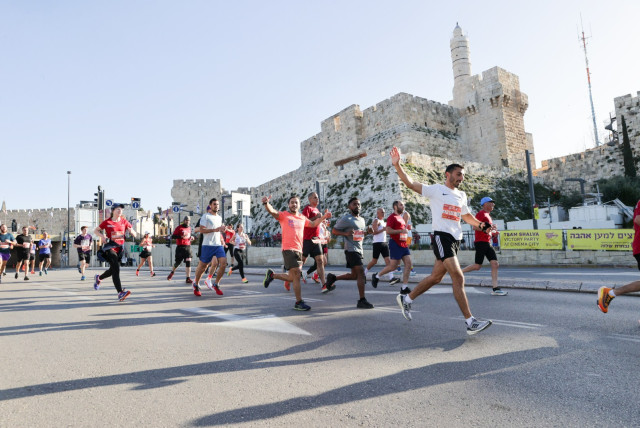This week in Jerusalem: Marathon is a go!

A weekly round-up of city affairs.

Marathon is a go!
The municipality debated for many weeks whether to hold the Jerusalem Marathon at this time. In the end, the decision was made to hold it on March 8. The traditional marathon will take place as planned as a salute to the IDF and the security and rescue forces.
“The holding of the marathon will allow thousands of runners who trained for many months for the Jerusalem Marathon and other marathons in the world to continue their training and achieve the sporting goals they set for themselves before the war,” the municipality said. “Registration is free of charge for IDF servicemen and women, the security and rescue forces, including reservists who served and are serving in the war. Wives and children of reservists who served or are serving in Operation Swords of Iron will receive a 50% discount on the registration fees for the marathon.”
Out of gas
Twenty-seven families on Kubovi Street in the Ramat Denya neighborhood have been cut off from gas supply since November. The tenants claim that Pazgas employees damaged the supply pipeline, while Pazgas claims that the pipeline is not its responsibility at all. According to some of the tenants, Pazgas representatives came and said that there was a leak, so they blocked the pipe. Residents ask why they are paying maintenance and insurance fees every month. So far, they say, no solution has been offered.
A clean break
Since the outbreak of the war, quite a few educational institutions in Jerusalem have dismissed contract workers from the east of the city. The students’ parents, some of whom volunteered to scrub toilets and empty trash cans themselves, reject allegations of racism, explaining: “We fear for the safety of our children. We will not take any risks.” In an unusual step, the Education Administration at Safra Square agreed to transfer the cleaning budget directly to the principals.
The disclosure of incidents in which contract workers were fired after expressing sympathy with the actions of Hamas or desecrating Israeli flags, and the municipality’s legal inability to check the backgrounds of workers hired by the educational institutions, led many elementary schoolchildren’s parents to give up the services of contract workers from east Jerusalem. As a result, parents – and even some school staff – took responsibility for sanitation instead so that the schools would have as few outsiders enter as possible. In some cases, the burden falls on the educational teams, who are obliged to respond to the demands of the worried parents.

The head of the Education Administration, Yoav (Zimi) Zimran, sent a letter to all school principals, in which he stated that “in the framework of a series of meetings held in the presence of the director-general of the municipality regarding school cleanliness, it was decided that a school that is interested in taking on the cleaning of the school, and undertakes to maintain such commitment until the end of the school year, should contact the director of the Department of Economy at the municipality and receive the budget designated for self-operation.”
East Silicon Valley
The Jerusalem Municipality’s Silicon Wadi project, which is to comprise 150,000 square meters of employment, commercial, and hotel space, has entered the implementation phase.
The first such phase will include the upgrading of all the infrastructure required for the future business complexes that will be built. According to the plan, an active and continuous commercial facade will be integrated along Wadi Joz Road and Othman Ben Affan Street, which will provide an urban walking sequence for the well-being of the residents of the nearby neighborhoods and east Jerusalem as a whole, beside eight- to 14-story buildings that will be built there.
The project, which was launched at the initiative of Mayor Moshe Lion, joins the government’s five-year plan to reduce social and economic disparities and help to further economic development in eastern Jerusalem. Among the goals of the project are to create approximately 10,000 quality jobs in east Jerusalem; increase trust between the population of eastern Jerusalem and the municipality; increase the employment rate of women from eastern Jerusalem; and strengthen the Israeli curriculum in the area’s education system as a key to higher education and employment. ■
